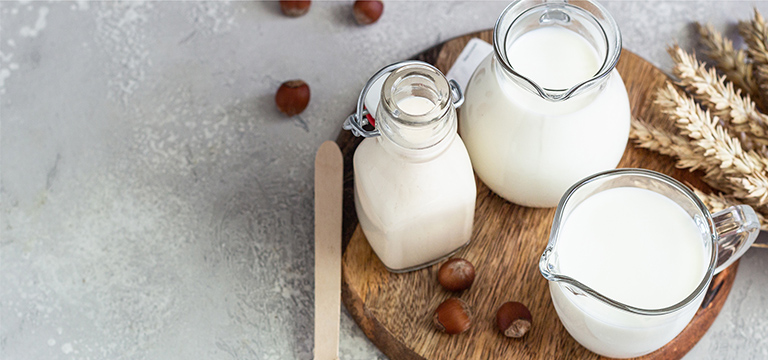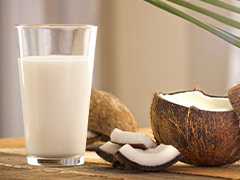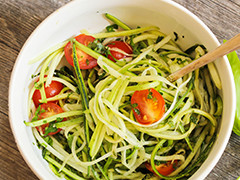Your Guide to Milk Alternatives

If you’re looking in the dairy section of the grocery store, there’s a good chance you’ve spotted something that looks like milk but doesn’t come from a cow.
Cow’s milk is becoming a less popular beverage. In 1970, people drank 29.8 gallons of cow’s milk a year, on average. In 2011, that number was just 20 gallons. This might be due, in part, to concerns about milk’s high fat and cholesterol content. Also, many people are unable to consume dairy and seek alternatives.
Are these milk alternatives really healthy for you? Here’s a quick breakdown.
Cow’s milk
Before we look at milk alternatives, let’s look at the nutrition of cow’s milk. Skim milk is a good choice for many because whole milk packs twice as many calories as skim milk and upwards of 8 g of fat. Meanwhile, skim milk contains little-to-no fat, tastes good and is rich in calcium and protein.
One glass of skim milk has 84 calories, less than 1 g fat, 101 mg sodium, 12 g carbs, 0 g fiber, 12.4 g sugars and 8.4 g protein.
Soy milk
This is a longtime choice for those sensitive to dairy. It has a similar calcium content to skim milk, but doesn’t have as much protein. Soy milk is good for making low-calorie smoothies or baked goods.
One glass of unsweetened soy milk has 105 calories, 3.6 g fat, 115 mg sodium, 12 g carbs, 0.5 g fiber, 8.9 g sugars and 6.3 g protein.
Almond milk
Almond milk has a slightly nutty flavor and creamy texture. It’s a great choice for anyone who's sensitive to both dairy and soy. Generally, it lacks the protein and calcium that’s in cow’s milk, but you can find some fortified varieties that are more nutritious. Almond milk also may improve your hair health thanks to its vitamin E content.
One glass of unsweetened almond milk has 39 calories, 2.5 g fat, 189 mg sodium, 3.4 g carbs, 0.5 g fiber, 2.1 g sugars and 1 g protein.
Oat milk
Oat milk is a newer milk alternative that’s become popular in recent years. Being made from oats, it helps support your heart and gut health and is rich in fiber. However, that also means it’s high in carbs. Oat milk contains 25% of the recommended daily value of calcium.
One glass of unsweetened oat milk has 120 calories, 5 g fat, 101 mg sodium, 16 g carbs, 1.9 g fiber, 7 g sugars and 3 g protein.
Cashew milk
While it has a very creamy texture and nutty flavor, cashew milk lacks the protein and calcium content. Look for brands that are fortified with calcium so you get your daily recommended amount.
One glass of unsweetened cashew milk has 130 calories, 10 g fat, 84 mg sodium, 8 g carbs, 0 g fiber, 2 g sugars and 4 g protein.
Bottom line, while skim milk can be great for your health, there’s no one perfect milk to drink. Since dairy is a big source of calcium, talk with your doctor before you switch to make sure you’re getting enough. Members can also connect with a registered dietician and get nutritional counseling with telehealth services.
Source:
https://www.verywellfit.com/which-milk-is-right-for-you-1087845
https://www.builtlean.com/dairy-milk-alternatives/


